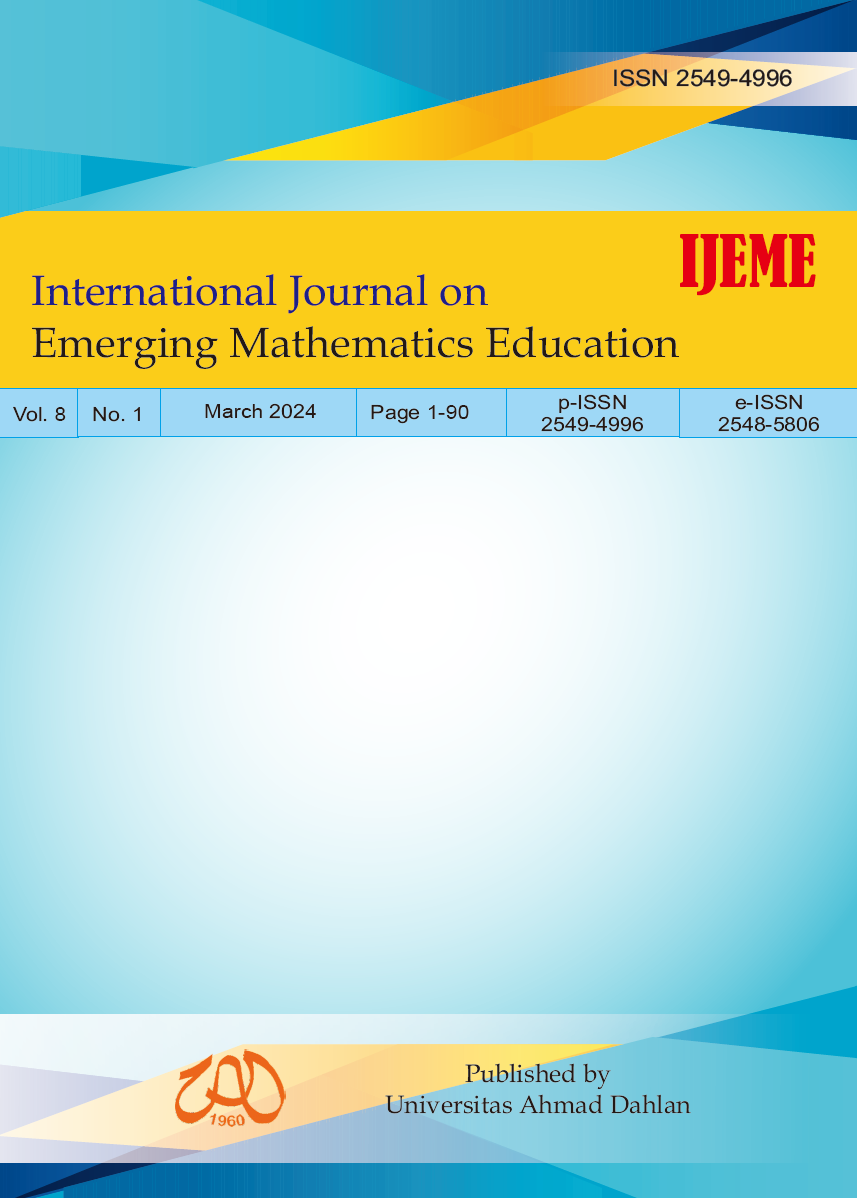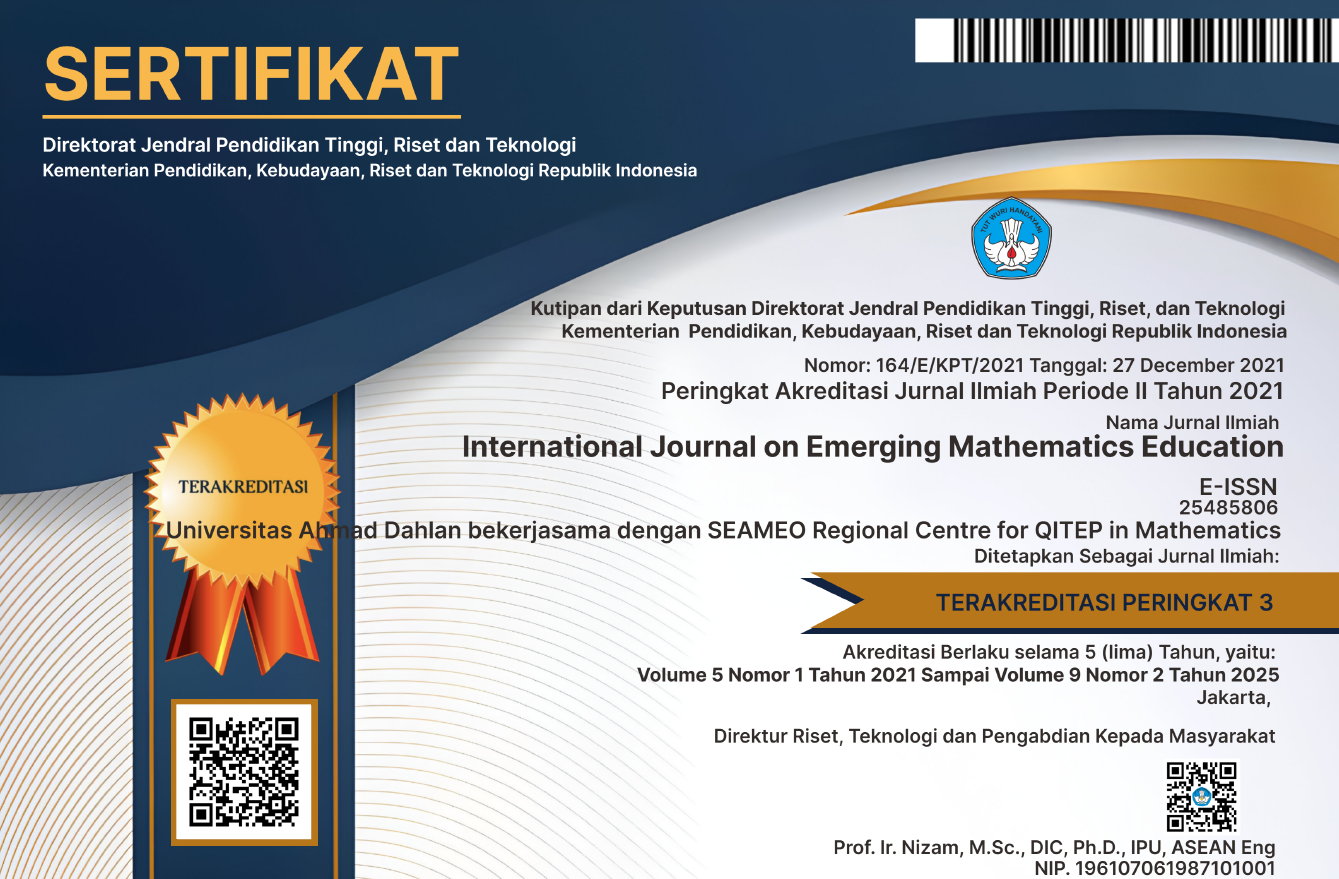The Effect of RME-Learning Trajectory on Mathematical Reasoning Ability and Self-Efficacy in Learning Statistics Using Congklak Games
DOI:
https://doi.org/10.12928/ijeme.v8i1.28459Keywords:
Learning Trajectory, Realistic Mathematics Education, Self-efficacy, StatisticsAbstract
This research aims to determine whether there is an effect of learning trajectory with the traditional congklak game context on mathematical reasoning ability in terms of self-efficacy. This study adopts a quasi-experimental approach using a 2 × 3 factorial design. The target population included all eighth-grade students at SMP Negeri 2 Wonogiri. The research employed cluster random sampling, selecting learners from two classes. The data collection techniques used were documentation, self-efficacy questionnaire, and mathematical reasoning abilities test. This study employed a data analysis approach that involved a two-way analysis of variance. The results of the hypothesis testing concluded that (1) learners who were taught using an RME-based learning trajectory with the traditional congklak game context showed better mathematical reasoning abilities compared to those taught through direct learning in statistics; (2) learners with high self-efficacy have better mathematical reasoning abilities than those with moderate or low self-efficacy, while learners with moderate self-efficacy showed better mathematical reasoning abilities than those with low self-efficacy; (3) there was no significant interaction observed between the treatment and self-efficacy regarding learners' mathematical reasoning abilities.
References
friansyah, E. A., Herman, T., Turmudi, T., & Dahlan, J. A. (2020). Mendesain soal berbasis masalah untuk kemampuan berpikir kritis matematis calon guru. Mosharafa: Jurnal Pendidikan Matematika, 9(2), 239- 250.
Agustiana, N., Supriadi, N., & Komarudin, K. (2019). Meningkatkan kemampuan penalaran matematis dengan penerapan pendekatan bridging analogy ditinjau dari self-efficacy. Inovasi Pembangunan: Jurnal Kelitbangan, 7(1), 61-61. Retrieved from https://jurnal.balitbangda.lampungprov.go.id/index.php/jip/article/view/117
Al Ashari, S. R., Mulyono, M., & Mariani, S. (2021). The Ability of Mathematical Reasoning and Self Efficacy Students in Learning Project Based Learning Assisted Moodle. Unnes Journal of Mathematics Education Research, 10(2), 220-226. Retrieved fromhttps://journal.unnes.ac.id/sju/index.php/ujmer/article/view/49032
Amir, M. Z., Urrohmah, A., & Andriani, L. (2021). The effect of application of realistic mathematics education (RME) approach to mathematical reasoning ability based on mathematics self
efficacy of junior high school students in Pekanbaru. Journal of Physics: Conference Series, 1776 (1). IOP Publishing. https://doi.org/10.1088/1742-6596/1776/1/012039
Arends, R. I. (2013). Belajar untuk Mengajar. Edisi 9 buku 2. Jakarta: Salemba Humanika.Bandura, A., Freeman, W. H., & Lightsey, R. (1999). Self-efficacy: The exercise of control. New York: W. H. Freeman and Company.
Burais, L., Ikhsan, M., & Duskri, M. (2016). Peningkatan kemampuan penalaran matematis peserta didik melalui model discovery learning. Jurnal Didaktik Matematika, 3(1), 77-86.
Clements, D. H & Sarama, J. (2009). Learning and teaching early math: the learning trajectories approach. New York: Routledge. https://doi.org/10.4324/9781003083528
Depdiknas. (2006). Permendiknas No 22 Tahun 2006 Tentang Standar Isi. Jakarta : Depdiknas.
Depdiknas. (2004). Peraturan Tentang Penilaian Perkembangan Anak Didik SMP No. 506/C/Kep/PP/2004 tanggal 11 November 2004. Jakarta: Dirjen Dikdasmen Depdiknas.
Fauzan, S., & Sari, R. M. M. (2018). Upaya meningkatkan kemampuan penalaran matematis dengan pendekatan realistic mathematic education pada siswa kelas vii smpn 1 karawang
barat. Prosiding Sesiomadika, 1(1b). Retrieved from
https://journal.unsika.ac.id/index.php/sesiomadika/article/view/2114
Hadiat, H. L., & Karyati, K. (2019). Hubungan kemampuan koneksi matematika, rasa ingin tahu dan self-efficacy dengan kemampuan penalaran matematika. Jurnal Riset Pendidikan Matematika,
(2), 200-210. http://dx.doi.org/10.21831/jrpm.v6i2.26552
Hendrik, A. I., Ekowati, C. K., & Samo, D. D. (2020). Kajian Hypothetical Learning Trajectories dalam Pembelajaran Matematika di Tingkat SMP. Fraktal: Jurnal Matematika dan Pendidikan
Matematika, 1(1), 1-11. https://doi.org/10.35508/fractal.v1i1.2683
Herbert, E., & Bragg, L. A. (2020). Factors in a professional learning program to support a teacher’s growth in mathematical reasoning and its pedagogy. Mathematics Education Research
Journal, 33(1), 409–433. http://dx.doi.org/10.1007/s13394-020-00310-5
Herbert, E., & Bragg, L. A. (2021). Elementary teachers’ planning for mathematical reasoning through peer learning teams. International Journal for Mathematics Teaching and Learning, 22 (1), 24-
https://doi.org/10.4256/ijmtl.v22i1.291
Herbert, S., Vale, C., Bragg, L. A., Loong, E., & Widjaja, W. (2015). A framework for primary teachers' perceptions of mathematical reasoning. International Journal of Educational Research, 74, 26-
https://doi.org/10.1016/j.ijer.2015.09.005
Herbert, S., Vale, C., White. P., Bragg, L. A., (2022). Engagement with a formative assessment rubric: A case of mathematical reasoning. International Journal of Educational Research. Volume 111.
https://doi.org/10.1016/j.ijer.2021.101899
Hidayati, A., & Widodo, S. (2015). Proses Penalaran Matematis Peserta didik dalam Memecahkan Masalah Matematika pada Materi Pokok Dimensi Tiga Berdasarkan Kemampuan Peserta didik
di SMA Negeri 5 Kediri. Jurnal Math Educator Nusantara, 1(2), 1–13.
Lisnani, L., & Asmaruddin, S. N. (2018). Desain Buku Ajar Matematika Bilingual Materi Bangun Datar Menggunakan Pendekatan PMRI Berkonteks Kebudayaan Lokal. Mosharafa: Jurnal
Pendidikan Matematika, 7(3), 345- 356.
The National Council of Teachers of Mathematics. (2009). Focus in high school mathematics: Reasoning and sense making. Reston, VA: National Council of Teacher of Mathematics. Retrieved from http://www.nctm.org
Somawati, S. (2018). Peran Efikasi Diri (Self Efficacy) terhadap Kemampuan Pemecahan Masalah Matematika. Jurnal Konseling Dan Pendidikan, 6(1), 39-39. https://doi.org/10.29210/118800
Suprapto, E. (2015). Pengaruh model pembelajaran kontekstual, pembelajaran langsung dan motivasi berprestasi terhadap hasil belajar kognitif. INVOTEC, 11(1).
Vale, C., Widjaja, W., Herbert, S., Bragg, L. A., & Loong, E. Y. K. (2015). A framework for primary teachers’ perceptions of mathematical reasoning. International Journal of Educational
Research. Volume 74. 26-37. https://doi.org/10.1016/j.ijer.2015.09.005
Vale, C., Widjaja, W., Herbert, S., Bragg, L. A., & Loong, E. Y. K. (2017). Mapping variation in children’s mathematical reasoning: the case of ‘what else belongs?’. International Journal of Science and Mathematics Education, 15(5), 873-894. https://doi.org/10.1007/s10763-016-9725-y
Wibowo, A. (2017). Pengaruh pendekatan pembelajaran matematika realistik dan saintifik terhadap prestasi belajar, kemampuan penalaran matematis dan minat belajar. Jurnal Riset Pendidikan
Matematika, 4(1), 1. http://dx.doi.org/10.21831/jrpm.v4i1.10066
Wijaya, A. (2012). Pendidikan Matematika Realistik. Graha Ilmu.
Downloads
Published
How to Cite
Issue
Section
License
Copyright (c) 2024 Nabila Uristu Al Firdaus, Budi Usodo, Yemi Kuswardi

This work is licensed under a Creative Commons Attribution-ShareAlike 4.0 International License.
License and Copyright Agreement
In submitting the manuscript to the journal, the authors certify that:
- They are authorized by their co-authors to enter into these arrangements.
- The work described has not been formally published before, except in the form of an abstract or as part of a published lecture, review, thesis, or overlay journal. Please also carefully read the International Journal on Emerging Mathematics Education (IJEME) Author Guidelines at http://journal.uad.ac.id/index.php/IJEME/about/submissions#authorGuidelines
- That it is not under consideration for publication elsewhere,
- That its publication has been approved by all the author(s) and by the responsible authorities, tacitly or explicitly, of the institutes where the work has been carried out.
- They secure the right to reproduce any material that has already been published or copyrighted elsewhere.
- They agree to the following license and copyright agreement.
Copyright
Authors who publish with the International Journal on Emerging Mathematics Education (IJEME) agree to the following terms:
- Authors retain copyright and grant the journal the right of first publication with the work simultaneously licensed under a Creative Commons Attribution License (CC BY-SA 4.0) that allows others to share the work with an acknowledgment of the work's authorship and initial publication in this journal.
- Authors are able to enter into separate, additional contractual arrangements for the non-exclusive distribution of the journal's published version of the work (e.g., post it to an institutional repository or publish it in a book), with an acknowledgment of its initial publication in this journal.
- Authors are permitted and encouraged to post their work online (e.g., in institutional repositories or on their website) prior to and during the submission process, as it can lead to productive exchanges, as well as earlier and greater citation of published work.
![]()
Ciptaan disebarluaskan di bawah Lisensi Creative Commons Atribusi-BerbagiSerupa 4.0 Internasional.





